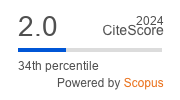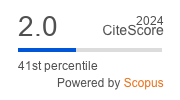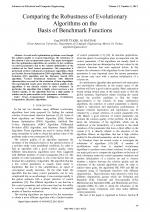| 2/2013 - 10 |
Comparing the Robustness of Evolutionary Algorithms on the Basis of Benchmark FunctionsDENIZ ULKER, E. |
| Extra paper information in |
| Click to see author's profile in |
| Download PDF |
Author keywords
computational intelligence, evolutionary computation, heuristic algorithms
References keywords
optimization(14), evolutionary(11), computation(9), algorithm(9), search(7), algorithms(7), harmony(6), applied(6), swarm(5), geem(5)
Blue keywords are present in both the references section and the paper title.
About this article
Date of Publication: 2013-05-31
Volume 13, Issue 2, Year 2013, On page(s): 59 - 64
ISSN: 1582-7445, e-ISSN: 1844-7600
Digital Object Identifier: 10.4316/AECE.2013.02010
Web of Science Accession Number: 000322179400010
SCOPUS ID: 84878946831
Abstract
In real-world optimization problems, even though the solution quality is of great importance, the robustness of the solution is also an important aspect. This paper investigates how the optimization algorithms are sensitive to the variations of control parameters and to the random initialization of the solution set for fixed control parameters. The comparison is performed of three well-known evolutionary algorithms which are Particle Swarm Optimization (PSO) algorithm, Differential Evolution (DE) algorithm and the Harmony Search (HS) algorithm. Various benchmark functions with different characteristics are used for the evaluation of these algorithms. The experimental results show that the solution quality of the algorithms is not directly related to their robustness. In particular, the algorithm that is highly robust can have a low solution quality, or the algorithm that has a high quality of solution can be quite sensitive to the parameter variations. |
| References | | | Cited By |
Web of Science® Times Cited: 4 [View]
View record in Web of Science® [View]
View Related Records® [View]
Updated 2 weeks, 6 days ago
SCOPUS® Times Cited: 6
View record in SCOPUS® [Free preview]
View citations in SCOPUS® [Free preview]
[1] Application of Hybrid Optimization Algorithm in the Synthesis of Linear Antenna Array, Deniz Ülker, Ezgi, Haydar, Ali, Dimililer, Kamil, Momoniat, Ebrahim, Mathematical Problems in Engineering, ISSN 1024-123X, Issue 1, Volume 2014, 2014.
Digital Object Identifier: 10.1155/2014/686730 [CrossRef]
[2] Advanced Metaheuristic Algorithms on Solving Multimodal Functions: Experimental Analyses and Performance Evaluations, Kuyu, Yiğit Çağatay, Vatansever, Fahri, Archives of Computational Methods in Engineering, ISSN 1134-3060, Issue 7, Volume 28, 2021.
Digital Object Identifier: 10.1007/s11831-021-09555-0 [CrossRef]
[3] Data Clustering on Breast Cancer Data Using Firefly Algorithm with Golden Ratio Method, DEMIR, M., KARCI, A., Advances in Electrical and Computer Engineering, ISSN 1582-7445, Issue 2, Volume 15, 2015.
Digital Object Identifier: 10.4316/AECE.2015.02010 [CrossRef] [Full text]
[4] Automatic Mining of Numerical Classification Rules with Parliamentary Optimization Algorithm, KIZILOLUK, S., ALATAS, B., Advances in Electrical and Computer Engineering, ISSN 1582-7445, Issue 4, Volume 15, 2015.
Digital Object Identifier: 10.4316/AECE.2015.04003 [CrossRef] [Full text]
[5] Is Gravitational Search Algorithm's Initial Gravitational Constant a Function Dependent Parameter?, Aziz Nor, Nor Azlina Ab., Aziz, Hidayati Abdul, Zulkifli, Aminurafiuddin, Ibrahim, Zuwairie, Rahman, Tasiransurini Ab., Proceedings of the 2018 International Conference on E-business and Mobile Commerce, ISBN 9781450364300, 2018.
Digital Object Identifier: 10.1145/3230467.3230480 [CrossRef]
Disclaimer: All information displayed above was retrieved by using remote connections to respective databases. For the best user experience, we update all data by using background processes, and use caches in order to reduce the load on the servers we retrieve the information from. As we have no control on the availability of the database servers and sometimes the Internet connectivity may be affected, we do not guarantee the information is correct or complete. For the most accurate data, please always consult the database sites directly. Some external links require authentication or an institutional subscription.
Web of Science® is a registered trademark of Clarivate Analytics, Scopus® is a registered trademark of Elsevier B.V., other product names, company names, brand names, trademarks and logos are the property of their respective owners.
Faculty of Electrical Engineering and Computer Science
Stefan cel Mare University of Suceava, Romania
All rights reserved: Advances in Electrical and Computer Engineering is a registered trademark of the Stefan cel Mare University of Suceava. No part of this publication may be reproduced, stored in a retrieval system, photocopied, recorded or archived, without the written permission from the Editor. When authors submit their papers for publication, they agree that the copyright for their article be transferred to the Faculty of Electrical Engineering and Computer Science, Stefan cel Mare University of Suceava, Romania, if and only if the articles are accepted for publication. The copyright covers the exclusive rights to reproduce and distribute the article, including reprints and translations.
Permission for other use: The copyright owner's consent does not extend to copying for general distribution, for promotion, for creating new works, or for resale. Specific written permission must be obtained from the Editor for such copying. Direct linking to files hosted on this website is strictly prohibited.
Disclaimer: Whilst every effort is made by the publishers and editorial board to see that no inaccurate or misleading data, opinions or statements appear in this journal, they wish to make it clear that all information and opinions formulated in the articles, as well as linguistic accuracy, are the sole responsibility of the author.



